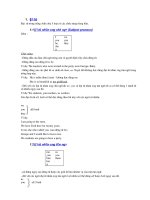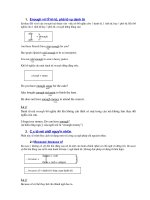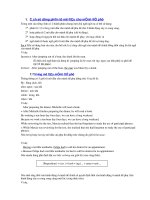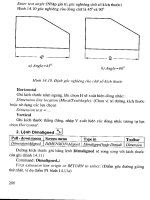Giáo trình Toefl phần 2
Bạn đang xem bản rút gọn của tài liệu. Xem và tải ngay bản đầy đủ của tài liệu tại đây (183.1 KB, 16 trang )
1. Đại từ
Đại từ trong tiếng Anh chia 5 loại có các chức năng riêng biệt.
1.1Đại từ nhân x ng chủ ngữ (Subject pronoun)
Gồm :
I we
you you
he they
she
it
Chức năng:
- Đứng đầu câu làm chủ ngữ trong câu và quyết định việc chia động từ.
- Đứng đằng sau động từ to be.
Ví dụ: The teachers who were invited to the party were George, Batty.
- Đứng đằng sau các phó từ so sánh nh than, as. Tuyệt đối không đợc dùng đại từ nhân xng tân ngữ trong
trờng hợp này.
Ví dụ: He is taller than I (am) - không đợc dùng me.
She is as beautiful as my girlfriend.
- Đối với các đại từ nhân xng chủ ngữ nh we, you và đại từ nhân xng tân ngữ nh us có thể dùng 1 danh từ
số nhiều ngay sau đó.
Ví dụ: We students, you teachers, us workers.
Các đại từ nh all, both có thể đợc dùng theo lối này với các ngôi số nhiều.
we
you all/ both
they
Ví dụ:
I am going to the store.
We have lived here for twenty years.
It was she who called you. (sau động từ be)
George and I would like to leave now.
We students are going to have a party.
1.2 Đại từ nhân x ng tân ngữ
me us
you you
him them
her
it
- nó đứng ngay sau động từ hoặc các giới từ làm nhiệm vụ của một tân ngữ.
- đối với các ngôi đại từ nhân xng tân ngữ ở số nhiều có thể dùng all hoặc both ngay sau đó.
us
you all / both
them
Ví dụ:
They called us on the phone.
complement
The teacher gave him a bad grade.
complement
John told her a story.
complement
The policeman was looking for him.
sau giới từ
To us, it seems like a good bargain
sau giới từ
L u ý : Nên nhớ rằng nhiều giới từ có thể có chức năng nh các thành phần khác trong câu, chẳng hạn nh phó
từ hoặc liên từ. Vì vậy, ta cần phải xác định các xem chúng đóng vai trò gì - cần dựa vào ngữ cảnh chứ
không phải dựa vào sự hiểu biết bình thờng về chức năng của chúng.
Ví dụ:
Janet will make her presentation after him.
preposition complement pronoun
Janet will make her presentation after he finishes his speech.
conjunction subject pronoun
clause
( một mệnh đề (clause) gồm 1 chủ ngữ và 1 động từ. Trong mệnh đề trên, he là chủ ngữ và finishes là động
từ).
1.3 Tính từ sở hữu
my our
your your
his
her their
its
- Nó đứng ngay trớc danh từ và chỉ sự sở hữu của ngời hoặc vật đối với danh từ đứng đằng sau.
Ví dụ:
John is eating his dinner.
This is not my book.
The cat has injured its foot.
The boy broke his arm yesterday..
She forgot her homework this morning.
My food is cold.
L u ý : Its khác với Its. Its có nghĩa là it is hoặc it has.
1.4 Đại từ sở hữu
mine ours
yours yours
his
hers theirs
its
- Dùng để thay thế cho tính từ sở hữu và danh từ đã đợc nhắc đến ở trên.
possessive pronoun + possessive adjective + noun
- Nó có thể đợc đứng làm chủ ngữ trong câu.
- Đứng đằng sau động từ to be.
- Nó có thể làm tân ngữ khi đi sau 1 động từ hoặc sau 1 giới từ.
Do you remember to take your money?
- Đứng đằng sau các phó từ so sánh nh than, as.
Your book is as good as mine.
Một số thí dụ:
This is my book = This is mine.
Your teacher is the same as his teacher = Yours is as the same as his.
Her dress is green and my dress is red = Hers is green is green and mine is red.
Our books are heavy = Ours are heavy.
Their coasts are too small. Theirs are too small.
I forgot my homework = I forgot mine.
1.5 Đại từ phản thân (reflexive pronoun)
myself ourselves
yourselfyourselves
himself themselves
herself
itself
L u ý : ở các ngôi số nhiều, đuôi - self biến thành - selves.
Chức năng:
- Chỉ chủ ngữ làm việc gì đó cho chính mình. Trong trờng hợp này nó đứng ngay sau động từ hoặc đứng ở
cuối câu sau giới từ for hoặc to.
Ví dụ:
He sent the letter to himself.
You can see the differences for yourselves.
- Chỉ chủ ngữ tự thân làm lấy 1 việc gì. Trong trờng hợp này nó đứng đằng sau chủ ngữ hoặc cuối câu khi
nói.
Ví dụ:
I myself believe that the proposal is good.
He himself set out to break the long distance flying record.
She prepared the nine-course meal herself.
The students themselves decorated the room.
You yourself must do this homework.
John himself bought this gifts.
By + one-self = alone.
Ví dụ:
John washed the dishes by himself = John washed the dishes alone.
2. Động từ dùng làm tân ngữ
- Không phải bất cứ động từ nào trong tiếng Anh cũng đòi hỏi 1 danh từ hoặc đại từ theo sau nó làm tân
ngữ. Có một số động từ lại yêu cầu tân ngữ sau nó phải là một động từ khác. Chúng chia làm 2 loại sau:
2.1 Động từ nguyên thể làm tân ngữ
Bảng sau là những động từ đòi hỏi tân ngữ sau nó phải là một động từ khác. Chúng tuân theo mẫu câu nh
sau:
agree to do something.
desire to do something.
decide to do something.
agree
desire
hope
plan
strive
attempt
expect
intend
prepare
tend
claim
fail
learn
pretend
want
decide
forget
need
refuse
wish
demand
hesitate
offer
seem
Ví dụ:
John expects to begin studying law next semester.
Mary learned to swim when she was very young.
The budget committee decided to postpone this meeting.
The president will attempt to reduce inflation in the next your years.
The soldiers are preparing to attack a village.
Cynthia has agreed to act as a liaison between the two countries.
2.2 Ving dùng làm tân ngữ
- Bảng sau là 1 số các động từ đòi hỏi tân ngữ sau nó là 1 Ving theo các mẫu câu sau:
admit doing something (thú nhận làm gì)
Ví dụ: He admitted having done wrong.
Enjoy doing something (thích thú khi làm điều gì)
admit
delay
miss
report
suggest
appreciate
deny
postpone
resent
avoid
enjoy
practice
resist
cant help
finish
quit
resume
consider
mind
recall
risk
L u ý : Trong bảng trên có mẫu động từ:
cant help
+ (against) doing smth : không thể dừng đợc, không thể nhịn đợc ...
cant resist
Ví dụ:
With such good oranges, we cant help (resist) buying 2 kilos at a time.
L u ý : Nếu muốn đặt phủ định cho các trờng hợp này đặt not trớc nguyên thể bỏ to hoặc Ving. Tuyệt đối
không đợc cấu tạo dạng phủ định của động từ chính.
Ví dụ:
John decided not to by the car.
We regretted not going to the party last night.
Một số thí dụ:
John admitted stealing the jewels.
We enjoy seeing them again after so many years.
You shouldnt risk entering that building in its present condition.
Michael was considering buying a new car until the price went up.
The Coast Guard reported seeing another ship in the Florida Straits.
Would you mind not smoking in this office?
* Các động từ ở bảng sau là những động từ mà tân ngữ của chúng có thể là động từ nguyên thể hay Ving
mà ngữ nghĩa của chúng không thay đổi.
Ví dụ:
begin to do smth = begin doing smth.
begin
hate
regret
cant stand
like
start
continue
love
try
dread
prefer
L u ý: Trong bảng trên có mẫu động từ :
to do smth
doing smth
Ví dụ:
waiting such a long time.
to wait such a long time.
I hate to ride her bicycle to school = I hate riding her bicycle to school.
2.3 3 động từ đặc biệt
Đó là các động từ mà ngữ nghĩa của chúng thay đổi khi tân ngữ sau nó là 1 nguyên thể hoặc 1 Ving.
Stop to do smth : dừng lại để làm gì.
Ví dụ:
He stops to get gasoline.
Stop doing smth : dừng việc gì đang làm lại.
Ví dụ:
He stops writing and goes out.
Remember to do smth : nhớ sẽ phải làm gì.
Ví dụ:
cant stand
( Không thể chịu đựng đợc khi phải làm gì)
I cant stand
I remember to send a letter at the post office.
Remember doing smth : nhớ đã làm gì.
Ví dụ:
I remember locking the door before leaving but I cant find the key.
Forget to do smth : quên sẽ phải làm gì.
Ví dụ:
He forgets to call his friend this afternoon.
Forget doing smth : quên đã làm gì.
Ví dụ:
I forget doing the homework yesterday.
L u ý : Động từ forget trong mẫu câu mang nghĩa phủ định.
I forget getting to the airport to meet my girl-friend this morning.
2.4 Các động từ đứng đằng sau giới từ
- Tất cả các động từ đứng đằng sau giới từ đều phải ở dạng Ving.
verb
adj. + preposition + Ving
noun
Động từ + giới từ + Ving
Bảng sau gồm các động từ + giới từ.
approve of: tán thành
give up: từ bỏ
rely on: phụ thuộc vào
worry about: lo lắng về
be better off:
insist on: nài nỉ
succeed in: thành công trong
count on = rely on
keep on = continue
think about
think of
depend on
put off: trì hoãn
Danh từ + giới từ + Ving (bảng sau)
possibility of
choice of
method of
intention of
method for
excuse for
reason for
Ví dụ:
George has no excuse for dropping out of school.
There is a possibility of acquiring this property at a good price.
There is no reason for leaving this early.
Connie has developed a method for evaluating this problem.
Tính từ + giới từ + Ving (bảng sau)
accustomed to
intent on
afraid of
interested in
capable of
successful in
fond of
tired of









